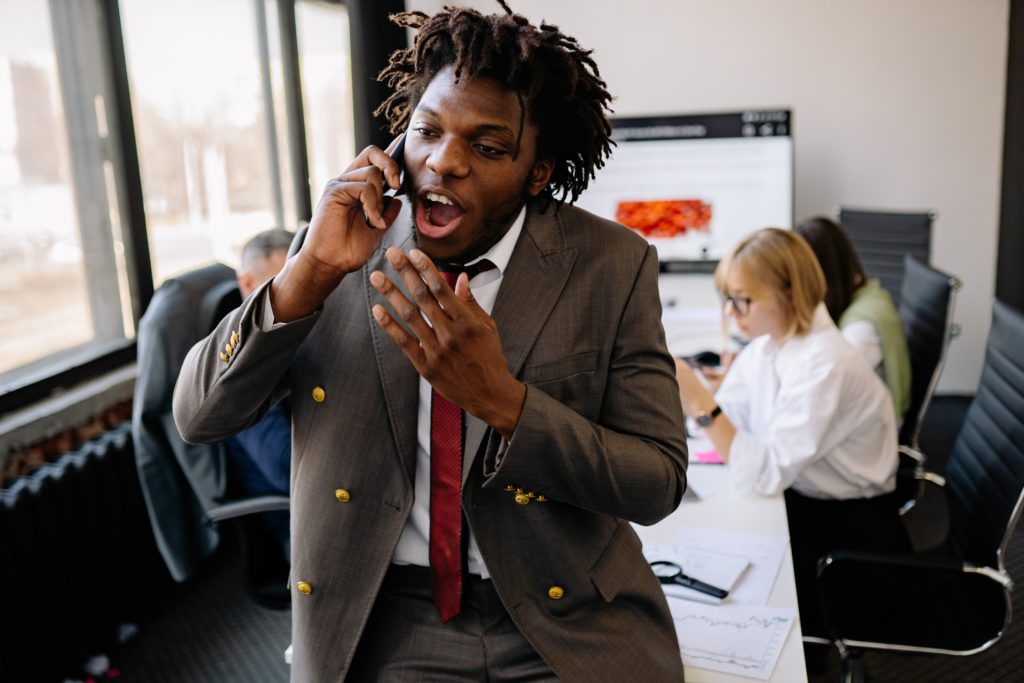Talking on the phone in Spanish may seem intimidating at first, but with the help of a few Spanish phone greetings and responses you’ll quickly gain confidence to make and receive phone calls in Spanish.
In this post we’ll start with the basics of answering the phone in Spanish, whether you’re talking to your friends or your clients. We’ll cover some of the most common questions and answers you might come across in a Spanish phone call, and finally introduce different ways to say goodbye and end a phone call in Spanish.
Since we’re talking all about phones here, we also provide you with a nice list of phone vocab in Spanish to help you talk about all that fun stuff like phone plans, voicemail, and leaving a message in Spanish. Now let’s get started!
How do you say “hello” when you answer the phone in Spanish?
The very first thing we say when we make or answer a call is to verify that the connection has been established with a basic greeting. The most common word we use in Spanish is aló.
This word is essentially an adaptation of the French word “allô,” which remains one of the main greetings when answering the phone in French-speaking cultures. It translates directly to the common greeting in English-speaking cultures of “hello.”
Here’s a list of the most common greetings when answering the phone in Spanish, with some differences between regions. The literal translations are noted here, but remember the most important meaning of each remains that they’re simply phone greetings.
- Aló – Hello, Allô
- Hola – Hello
- Bueno (México) – Well, Good
- Diga (Colombia and others) – Say
- ¿Sí? – Yes?
You probably already know these next expressions which are also used as phone greetings in Spanish. They are frequently used in more formal contexts, such as when calling businesses.
- Buenos días – Good morning
- Buenas tardes – Good afternoon
- Buenas noches – Good evening
You can always include personal information right after the greeting, or ask for the person you want to speak with.
- This is Dani speaking. – Habla Dani.
- You are speaking with Andrea Rodríguez. – Habla con Andrea Rodríguez.
- I would like to speak with Mrs. Paez. – Me gustaría hablar con la señora Paez.
Phone etiquette in Spanish
Which Spanish verb tense should I use on the phone?
The best tense to express our intentions on the phone is the present, so you can always play it safe by using the simple present or the present progressive.
- I call to ask for a cab service. – Hablo para pedir un servicio de taxi.
- I’m calling to order a burger with fries. – Estoy llamando para pedir una hamburguesa con papas.
When we want to make a request or to ask for information over the phone in Spanish, we generally use the conditional to make the request a bit more polite.
- Would it be possible to change my address? – ¿Sería posible cambiar mi dirección?
- Could you transfer my call to the sales department? – ¿Podría transferir mi llamada al departamento de ventas?
- Could you let him know I called? – ¿Podría decirle que llamé?
We also often use the verb “querer” (to want) in the imperfect subjunctive: “quisiera” is a polite way of saying “I would like to.”
- I would like to know if I can change my phone plan. – Quisiera saber si puedo cambiar mi plan telefónico.
- I would like you to know the status of my request. – Quisiera saber el estado de mi solicitud.
- I would like to speak with the manager. – Quisiera hablar con el gerente.
Common phone questions and answers in Spanish
These expressions are often used in phone calls in Spanish, so there’s a high chance that you’ll use or hear them in a conversation.
- I’m calling for… – Estoy llamando por…
- Let me get back to you as soon possible. – Déjeme devolverle la llamada lo antes posible.
- He / She is not available. – Él / Ella no está disponible.
- Can I take / leave a message? – ¿Puedo tomar / dejar un mensaje?
- One moment, please. – Un momento, por favor.
- Please hold. – Por favor, espere.
- Could you spell that for me, please? Thanks. – ¿Podría deletrearlo, por favor? Gracias.
As we talk on the phone, we have several common phrases to let the other person know we understand what they’re saying (or not!).
- Ok – Just like in English, “ok”
- Vale – Another simple way of saying “ok”
- Sí – The reliable “Yes”
- Entiendo – “I understand”
If we’re having trouble understanding, however, here are a few useful phrases:
- Could you speak slower, please? – ¿Podrías hablar un poco más lento, por favor?
- Could you repeat, please? – ¿Podrías repetir, por favor?
- I don’t understand, could you rephrase that? – No entiendo, ¿Podría reformularlo?
Once we are sure that most of the message was understood by both parties, we proceed to end the call. One of the nicest things we can do is to thank the other person for their time, particularly if it was a long call.
- Thank you! – ¡Gracias!
- Thank you for your time / help. – Gracias por su tiempo / ayuda.
- Thank you for chatting with me for a while. – Gracias por hablar conmigo un rato.
- Thank you for calling. – Gracias por llamar.
Sometimes a call can end for other reasons.
- I’ll call back later. – Llamaré de nuevo más tarde.
- I have to go. Sorry. – Tengo que irme, lo siento.
- I can’t talk right now. – No puedo hablar ahora.
- Sorry, wrong number. – Lo siento, número equivocado.
Finally, when the time to hang up the phone comes, we use a few very common words and phrases to say goodbye in Spanish.
- Bye! – ¡Chao, adiós!
- Talk to you later. – Te hablo luego.
- We’ll speak later. – Hablamos luego.
- Until another time. – Hasta luego.
How do you talk about phones in Spanish?
Here’s a handy list of words and phrases to talk about phones and phone calls in Spanish.
Phone phrases
- To call somebody – Llamar a alguien
- To dial a number – Marcar un número
- What’s your number? – ¿Cuál es tu número de teléfono?
- My number is… – Mi número de teléfono es…
- To have the wrong number – Tener el número equivocado
- To leave a message – Dejar un mensaje
- Voicemail – Correo de voz
- To call back – Devolver la llamada
- To pick up (the phone) – Contestar
- To hang up (the phone) – Colgar
- The ringtone – El tono de llamada
- Silent mode – Modo silencioso
- Vibrate mode – Modo vibración
- Volume – Volumen
- Press the pound key (#) – Presiona la tecla numeral (#)
- Press the star key (*) – Presiona la tecla asterisco (*)
Types of phones
- Cellphone – Teléfono celular
- Smartphone – Teléfono inteligente
- Fixed phone – Teléfono fijo
- Home phone – Teléfono de casa
- Office phone – Teléfono de oficina
Types of calls
- Voice call – Llamada de voz
- WhatsApp call – Llamada de WhatsApp
- Video call – Videollamada
- Automated menu – Menú automatizado
- SMS / text message – Mensaje de texto / texto
Phone service
- Pre-paid plan – Plan pre-pago
- Post-paid plan – Plan pospago
- Fixed plan – Plan fijo
- Lines – Líneas
- Minutes – Minutos
- Credits – Créditos
- Sim card – Tarjeta sim
Example phone conversation.
A: Aló, habla carmen se ha comunicado con el hotel Río, ¿En qué puedo ayudarle?
B: Buenos días. Quisiera hacer una reserva para el 25 de abril.
A: Muy bien, tengo una habitación doble disponible para ese día.
B: Disculpe, no entiendo , ¿podría hablar más lento, por favor?
A: Sí, tengo una habitación doble disponible para ese día. ¿Me entiende?
B: Entiendo, es perfecto. Quisiera reservar a mi nombre John Mathews.
A: Muy bien, ¿Podría deletrear su apellido, por favor?
B: Sí, es M-A-T-H-E-W-S.
A: Listo. Muchas gracias por comunicarse con nosotros.
B: Muchas gracias por su tiempo, adiós.
Conclusion
Now that you know the essentials and a little more, you’re well on your way to feeling comfortable answering the phone in Spanish, having a conversation, hanging up politely, and generally just talking about phones in Spanish.
What do you think? Why not take a chance and phone that Latin American friend you’ve been meaning to call!




